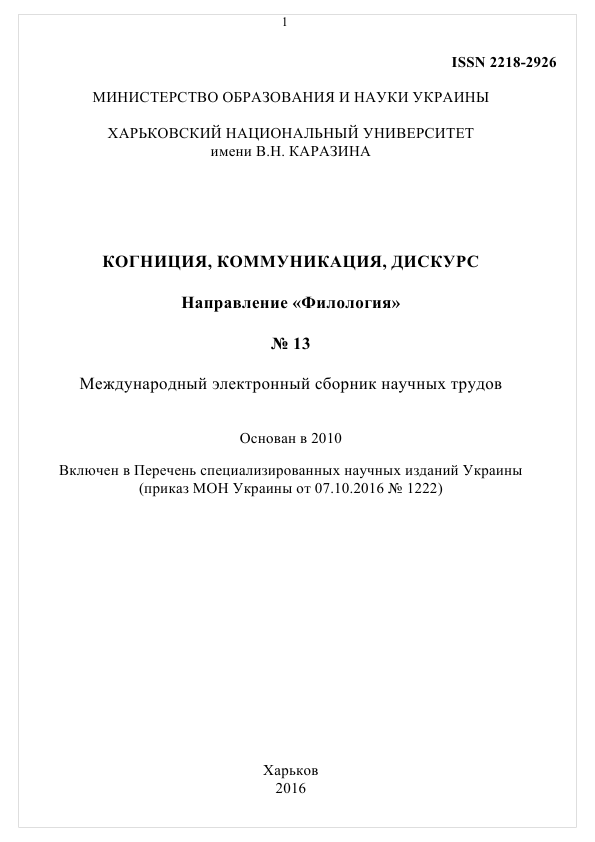Evolutional mechanisms of cognitive semantics
Abstract
In this article I reviewed and systematized the basic mechanisms of evolutionary transformations of lexically represented concepts. On the basis of cognitive-discursive research paradigm I suggest methods and algorithm for the diachronic study of cognitive and linguocultural concepts, in particular, concepts of communicative behavior. Within the framework of historical cognitive semantics I summarize the data for diachronic variation of cognitive and linguocultural English concepts and define vectors of their transformations as evolution (anagenesis, cladogenesis), involution or a mixed type development.
Downloads
References
Bergson, H. (2007). L'Évolution créatrice. Paris : PUF, coll. «Quadrige».
Bondarenko, Ye.V. (2012). Evoliutsiia poniattia chasu v anhliiskii movi ta u dyskursi. [The evolution of the concept of time in the English language and discourse]. Doctoral dissertation, V.N. Karazin Kharkiv National University, Kharkiv, Ukraine (in Ukrainian).
Bondarenko, Ye.V. (2014). Matrichnoe modelirovanie. Dual'nost' vremeni v anglojazychnoj kartine mira [Matrix modeling. Duality of time in the English language worldview]. Kharkiv: Kharkiv Univ. Press.
Burenko, T.M. (2008). Kohnityvno-prahmatychni kharakterystyky movlennievoho aktu vybachennia v anhlomovnomu dyskursi XVI–XXI stolit [Cognitive-pragmatic characteristics of the speech act of apology in the English discourse of the 14th – 21st centuries]. Candidate dissertation, V.N. Karazin Kharkiv National University, Kharkiv, Ukraine (in Ukrainian).
Carston, R. (2002). Thoughts and Utterances. The Pragmatics of Explicit Communication. Oxford: Blackwell.
Chesnokov, I.I. (2009). Mest’ kak emotsional’nyy povedencheskiy kontsept (opyt kognitivnokommunikativnogo opisaniya v kontekste russkoy lingvokul'tury [Revenge as Emotional Behavioral Concept]. Dr. diss. Synopsis, Volgograd State Pedagogic University, Volgograd, Russia (in Russian).
Ilyin, А.А., & Kozhevnikov, N.N. (2005). Filosofskij analiz osnovnyh aspektov jevoljucii [Philosophic analysis of the main evolutionary aspects]. Vestnik YaGU. – Yakutsk State Univ. Messenger , 2, № 1, 52–59 (in Russian).
Karasik, V.I. (2007). Yazykovye kl’uchi [Linguistic clues]. Volgograd: Paradigma Publ.
Kubryakova, Ye. (2004). Yazyk i znanie: Na puti polucheniya znaniy o yazyke: Chasti rechi s kognitivnoy tochki zreniya. Rol' yazyka v poznanii mira [Language and Knowledge]. Moscow: Yazyki slavianskoj kultury Publ.
Langacker, R.W. (1987). Foundation of Cognitive Grammar (Vol. 1. Theoretical prerequisites). Stanford CA: Stanford University Press.
Olyinyk, N.A. (2015). Kontsept EKONOMIChNA KRYZA v anhlomovnomu ekonomichnomu dyskursi 1930-kh i 2000-kh rokiv [The concept ECONOMIC CRISIS in the English economic discourse of the 1930s and 2000s]. Candidate dissertation, V.N. Karazin Kharkiv National University, Kharkiv, Ukraine (in Ukrainian).
Polina, A.V. (2004). Jazykovaja obektivacija koncepta BOG v anglijskom diskurse XIV–XX vv. [Linguistic objectivization of the concept GOD in the English discourse of the 14th – 20th centuries]. Candidate dissertation, V.N. Karazin Kharkiv National University, Kharkiv, Ukraine (in Russian).
Shevchenko, I.S. (2013). Kontcepty kommunikativnogo povedeniia i diskurs [Concepts of communicative behavior and dicourse]. Visnyk Kharkiv. nats. un-tu im. V.N. Karazina. – V.N. Karazin Kharkiv National Univ. Messenger, 1072, 15–20 (in Russian).
Slyshkin, G.G. (2004). Lingvovokulturnye kontcepty i metakontcepty [Linguocultural concepts and metaconcepts]. Volgograd: Peremena Publ.
Stepanov, Yu.S. (1997). Konstanty: Slovar russkoi kultury [Constants: A Glossary of Russian Culture]. Moscow: Shkola “Yazyki russkoj kultury” Publ.
Turchenko, V.O. (2014). Kohnityvno-komunikatyvni kharakterystyky kontseptu SKROMNIST v anhlomovnomu dyskursi XIV – XXI stolit [Cognitive-communicative characteristics of the concept MODESTY in the English discourse of the 14th – 21st centuries] Candidate dissertation, V.N. Karazin Kharkiv National University, Kharkiv, Ukraine (in Ukrainian).
Vakhovskaya, O.V., & Shevchenko, I.S. (2013). Koncept GREH v anglojazychnoj kartine mira. Jevoljucija v diskurse XIV-XXI vekov [Concept SIN in the English World View. The Evolution in the 14th-21st Centuries Discourse]. Saarbrucken: Lambert Academic Publishing.
Zhabotynskaya, S.A. (2013). Imia kak tekst: kontceptualnaia set leksicheskogo znacheniia (analiz imeni emotcii) [The name as a text: conceptual network of lexical meaning (analysis of the name of emotion)]. Kognitsia, kommunikatsia, diskurs – Cognition, communication, discourse, 6, 47–76. Retrieved from: https://sites.google.com/site/cognitiondiscourse/vypuskno6-2013/zabotinskaa-s-a. (in Russian).
Zmiyova, I.V. (2006). Lingvokognitivnye kharakteristiki sredstv verbalizatcii kontcepta DOBRO v angliiskom iazyke [Linguocognitive characteristics of the means verbalizing the concept GOOD in English]. Candidate dissertation, V.N.Karazin Kharkiv National University, Kharkiv, Ukraine (in Russian).
Authors, who publish with this journal, accept the following conditions:
The authors reserve the copyright of their work and transfer to the journal the right of the first publication of this work under the terms of the Creative Commons Attribution License (CC BY), which allows other persons to freely distribute a published work with mandatory reference to the authors of the original work and the first publication of the work in this journal.
Authors have the right to enter into separate additional agreements for the non-exclusive dissemination of the work in the form in which it was published by this journal (for example, to post the work in the electronic institutions' repository or to publish as part of a monograph), provided that the link to the first publication of the work in this journal is given.
The journal policy allows and encourages the authors to place the manuscripts on the Internet (for example, in the institutions' repositories or on personal websites), both before the presentation of this manuscript to the editorial board and during review procedure, as it contributes to the creation of productive scientific discussion and positively affects the efficiency and dynamics of citing the published work (see The Effect of Open Access).




